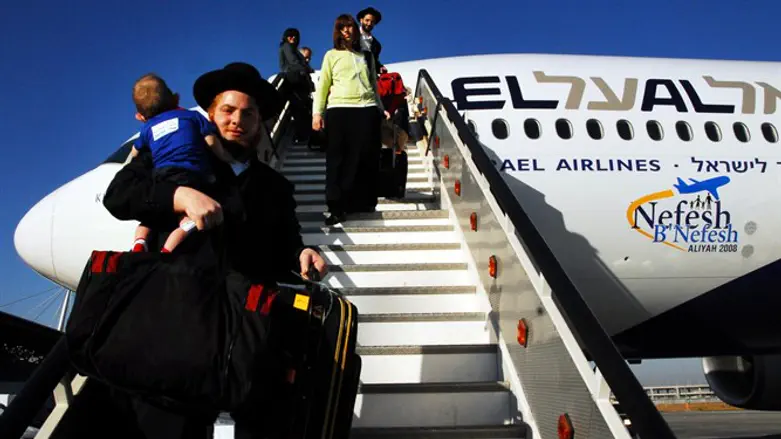
The International Fellowship of Christians and Jews (Keren L'Yedidut) has published its data findings on the 4,800 immigrants (olim) who moved to Israel in 2018 through The Fellowship as well as results from a survey conducted among the olim to examine the level of success with their integration into Israel.
Twenty-nine hundred of the olim came from the Ukraine, about 60% of the total number who moved to Israel from the war-torn country. Six hundred came from France, constituting 30% of all olim who came to Israel from the western European country in 2018. The rest of the olim came from other countries in eastern Europe as well as some in Latin America such as Brazil, Uruguay and Argentina.
About 13% of the olim are engineers, and the rest are primarily economists, real estate agents, teachers and principals. The record-holding city this year for the number of olim absorbed in a respective municipality is Haifa, followed by Bat Yam and Nahariya. One-third of the olim are between the ages of 30 and 50. Eighteen percent lie within the ages of 50 and 70, and 22% are children 10 years old and younger.
The Fellowship has also gathered data from a survey conducted by the Geocartography Knowledge Group that included 803 participants who speak Russian, French, Spanish or Portuguese (making up the majority of olim) and had moved to Israel over the last four years. Asked of their motives for making aliyah, 45% of olim moved to Israel for economic reasons, and another 40% were pulled to reunite with family members who were already living in Israel. Nine percent were pushed to make aliyah due to anti-Semitism in their respective home countries.
According to the survey’s results, an overwhelming majority of olim appear to be satisfied with their absorption process in Israel. Eighty percent of the olim said that if they could go back to their countries of origin while having known beforehand all that what was in store for them in Israel, they would still decide to return to the Jewish state. In correlation, 81% of the olim defined their experience in Israel as "very good" or at the very least, "pretty good."
About 77% of olim said that the assistance provided by the State of Israel was "very satisfactory" or "sufficient," while only 2% felt it to have been an "insufficient" amount. Also, more than 86% felt that the way Israelis have related to them has been “good” or “very good.”
At the same time, the survey also indicates that the economic situation for some olim has not been absent of difficulties and challenges. The survey found that only 18% of the olim feel that they are suitably employed. Twenty-one percent of olim said they have not found employment befitting their qualifications, and 23% said they are not employed at all. Accordingly, many of the olim find themselves in financial difficulty with only 22% describing their economic situation as one in which they have more than enough to provide for their basic needs. One out of every four of the olim in the survey said either that they barely have enough or not enough at all to meet their most basic needs. Founder and President of The Fellowship, Rabbi Yechiel Eckstein is calling upon Israel to step up its support for olim in order to help further facilitate their absorption process.
"Today, a Jewish family can choose between immigration to Israel and immigration to other countries including Western countries," Rabbi Eckstein noted.
“Therefore, Israel must be the preferred alternative and ensure that its immigrants enjoy economic security and a diverse array of employment opportunities. The State of Israel must make every effort to ensure that an efficient and welcoming reception system in Israel as well as a tolerant and supportive society awaits the olim upon their arrival. This requires among other things a full-time absorption minister, which Israel currently lacks.
Rabbi Eckstein stressed that The Fellowship has already been assuming a significant amount of responsibility in this regard.
“The Fellowship invests tremendous resources in olim and aliyah, so it is no surprise that a growing proportion of olim choose to immigrate to Israel through us."
For more than 20 years, the International Fellowship of Christians and Jews has been helping Jews to make aliyah and has invested more than $200 million in bringing approximately 750,000 olim to Israel. The Fellowship has also been a major contributor to the Jewish Agency and helped to establish the Nefesh B'Nefesh organization.
In 2014, The Fellowship began operating independently in the field of immigration. Since then, The Fellowship has brought 16,000 olim to Israel from 29 countries around the world. The olim receive comprehensive assistance from The Fellowship including special grants of $500 per adult and $300 per child. The Fellowship also sponsors their flights to Israel and ensures that they receive the absorption basket that they are entitled to under Israeli law.
Additionally, The Fellowship works to make sure that the immigrant families are absorbed within their respective municipalities, particularly with regards to housing and employment. Moreover, The Fellowship continues to advise the families even after their absorption process.